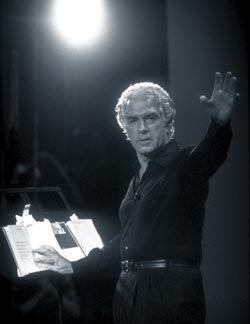Giants of Commedia: Giorgio Strehler
Giorgio Strehler was the founder (along with Paolo Grassi) and director of the Piccolo Teatro di Milano. Some would say that he is the father of modern commedia. I don’t think I would go that far, as there were a number of disparate Italian groups working after the war that were trying to figure out how to resurrect Italian pride, and thinking that commedia may be the long lever with which to do so. I think one could easily suggest that Strehler was the leader of the most successful of those groups– and his collaborators (Sartori, Fo, LeCoq, Mazzone-Clementi, Solieri) all went on to develop their own work in new and exciting ways.
An interesting point is that in some ways, Strehler legitimized the role of the director in Italian theatre. Before him Italian actors were primarily self-directed, much like what we think of the Commedia. Directors were managers of companies and had no artistic say in what happened. The actors hashed it out among themselves. Strehler with his meticulous stage designs and ability to create striking stage pictures changed all that within Italy.
In 1947 Strehler staged a forgotten Goldoni classic Arlechino: Servant of Two Masters which would become the longest running play in Italian history, and the play that resurrected commedia from the dustbins of history.
You can read more about Strehler’s life and even some of his texts about his work on the website http://www.strehler.org. Of course it’s all in Italian, so if you don’t read Italian, you might have a problem. I’ve added this to the bit.ly lexicon: http://www.bit.ly/strehler which is the same page translated via a Google filter.
NY Times Strehler obit:Â http://bit.ly/strehler_obit
NY Times review of Arlechino (at Lincoln Center): http://nyti.ms/arlechino
And most importantly, here’s some video of Arlechino: Servant of Two Masters by Strehler– re-staged recently by Ferrucio Solieri, who was Strehler’s Arlechino.


These posts on the revival of commedia reminded me of this passage from Acrobats and Mountebanks, by Hugues Le Rous & Jules Garnier, London, 1890 (p278): “At the present time Italian pantomime is an extinct art. In the time of Watteau the poor masks had already lost their definite outlines, and their idiosyncrasies had become misty and dim. They are now effaced, dispelled by the clouds of powder which the clown launched . . . .”
David: Great quote. It puts me into mind the descendants of commedia (which is the subject of a future post this month)– and although some might say pale imitations, I would argue that these things are standing on the shoulders of giants, but have become their own things. Ballet, Punch and Judy, Pantos, and sitcoms, to name a few.
Pingback: Adrian Noble, director – portrait of the artist